How To Price Services for Your Cleaning Business
Are you thinking of starting a cleaning business but don't know what to charge your customers? Here's a guide on how to price cleaning services for you.
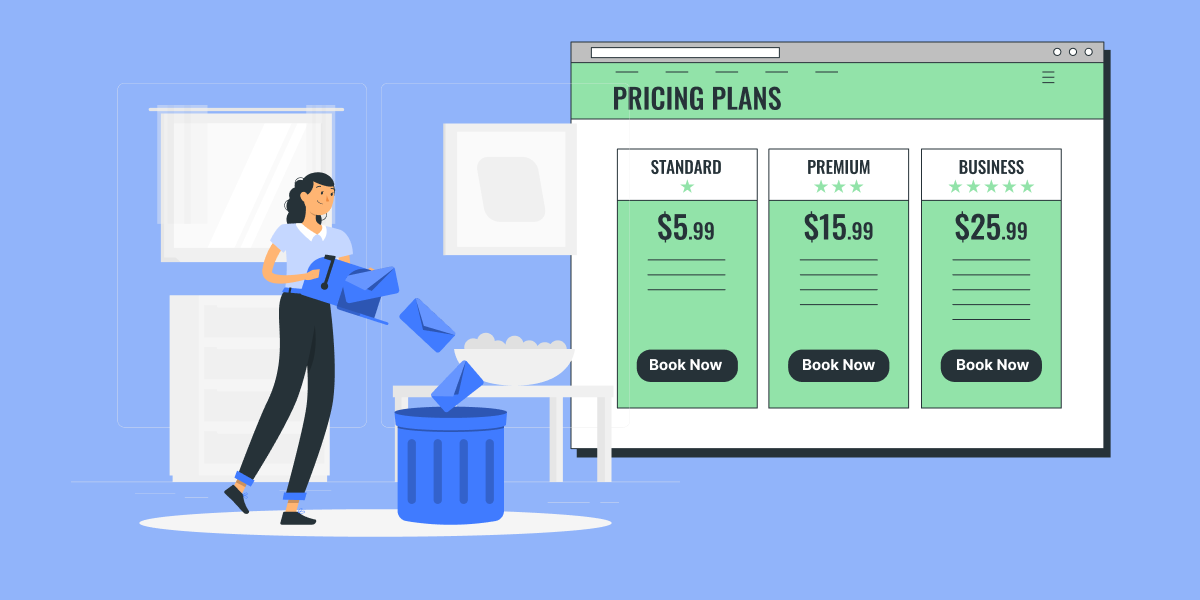
Launching a profitable cleaning business is exciting yet daunting. For one, you’re entering a very competitive market — now more than ever, cleaning is a priority at home and work.
You’re now wondering: how do I price cleaning services to maximize profits and attract more customers?
You see, there’s no one-size-fits-all approach to estimating cleaning costs. If you charge too high, you’ll lose customers and contracts. If you charge too low, you won’t make enough to cover labor, supplies and equipment, and overhead costs.
We’re here to help! In this guide, we’ll walk you through everything you need to know to set house cleaning prices that are right for your business.
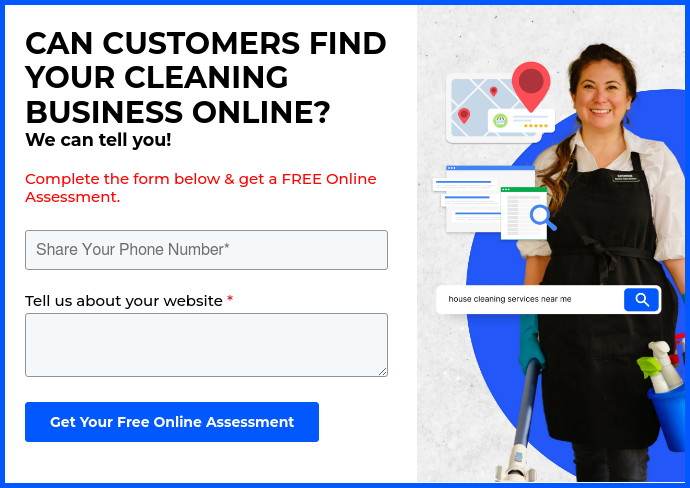
Jump to:
-
Factors That Affect House Cleaning Prices
-
How Residential Cleaning Needs Are Different From Commercial Cleaning
-
Methods for Calculating House Cleaning Cost
-
Understanding Break-even and Profit Margins
-
Cleaning Rates Based on House Type
-
Evaluate How You're Pricing Your Services
Factors That Affect House Cleaning Prices
Several factors can influence the cost of cleaning a house. To get off on the right foot, it helps to know the average cleaning rates nationally and in your area.
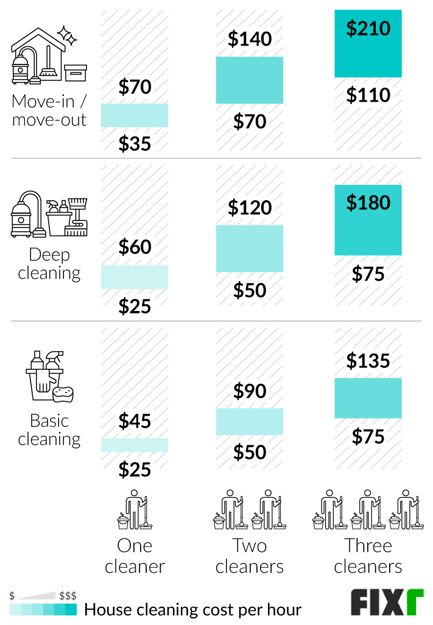 Source: Fixr
Source: Fixr
House cleaning rates vary by state, most often influenced by the cost of living. The national average, however, is between $150 and $250 for a house cleaning service. Meanwhile, the hourly rate can range between $25 to $90, depending on the scope of work and the number of cleaners.
Now, let’s take a look at some of the most crucial factors to consider when setting prices for your house cleaning services.
Types of Cleaning Services
Generally, you should be charging more for cleaning services that are more specialized and intensive.
Ask yourself: to what extent are you cleaning? Does the customer have specific requirements? Are there any service add-ons you should offer and up-charge appropriately?
Cleaning services usually fall into these categories:
- Basic/Standard Cleaning. This type of cleaning typically includes mopping, sweeping, dusting, and vacuuming in all rooms. You can charge less for simple, routine cleaning tasks that don’t require much time and resources.
- Key selling point - If you want to specialize in this particular service, you’re going to want to focus on speed and efficiency. Customers are going to want a bargain and convenience, so the lower the price and faster you can clean (and still do a good job), the better. This is a great service for cleaning pros to have their quick cleaning process down to a “T.”
- Deep Cleaning. This type of cleaning is more extensive, as it focuses on removing dirt and grime from all the nooks and crannies, reducing allergens, and improving the air quality in the home. It also includes sanitizing, scrubbing, wiping, and dusting hard-to-reach spots such as ceiling fans, light fixtures, windows, refrigerators, etc. You’ll charge more for deep cleaning as it requires more manpower, time, and supplies. A deep clean can cost between $200 to $400 on average, depending on the size of the house.
- Key selling point - To be a top business focusing on deep cleaning, you’re going to want to become an expert at safe and effective chemicals and tools. You’ll be taking your time on cleaning services, and customers expect pristine results.
- Move-in/Move-out Cleaning. This type of cleaning is pricier since it’s also in-depth and requires more work. It’s a top-to-bottom cleaning that involves scrubbing walls, kitchen cabinets, and cupboards and cleaning the insides of the oven and refrigerator.
- Key selling point - Renters hire these services in an effort to leave no trace from past tenants and/or retain their security deposit. For this type of cleaning, you’ll want to be efficient while also having a firm grasp on what landlords look for when handing the living space off to the next occupant. If you’re good at deep cleanings, this is a good service to add to your menu.
- After-event Cleaning. This type of cleaning requires tidying up after the aftermath of a party or any other event. It usually involves removing trash, cleaning dirty dishes, and ensuring the living room is spotless. The price depends on the size of the home and whether it will be a basic clean or a deep clean.
- Key selling point - Events often end later in the evening, and while some venues allow you to come and clean the next morning, many will expect the space to be completely clear before business hours the next day. So maintaining good relationships with venues and event planners, while also being available for third-shift work, is critical.
- Post-construction Cleaning. This type of cleaning is expensive because it involves specialized cleaning. You’ll need to consider the skills and supplies needed for cleaning and clearing the property of debris and possibly hazardous waste. Residential post-construction cleaning jobs go anywhere from $400 to $800.
- Key selling point - This is the grittiest cleaning service. So you’ll do well if you know how to handle hazards (both physical and chemical) safely. You’ll also need to be willing and able to take care of hard-to-get-to sites.
Factor in add-on services for cleaning jobs that require specialized skills and supplies. These may include cleaning and maintenance of carpets, green cleaning, outdoor cleaning, and cleaning of a home with pets.
Number of Cleaners Needed To Complete the Job
Does the cleaning job require a one-person team or a crew of expert cleaners? This is a crucial detail in determining house cleaning prices. Of course, this also depends on the size and condition of the house, and the number of rooms.
A bigger house takes longer to clean, so adjust your rates as necessary. The size of the house, the manpower, the timeline, and the supplies — all of these will help you figure out if you’ll charge by the square footage, by the number of rooms, or by the hour. More on this later.
Location of the Property
You need to consider two things when it comes to location:
- Where your client lives
- The average prices in your area
If your customer’s home is located far from your business location, you need to charge more for travel time and fuel. It’s best to assign cleaning jobs based on proximity to your location. For example, you can schedule customers living close by on the same day to save on costs.
Evaluate the market by knowing the average prices in the area and how much the competition is charging. This will help you get a better sense of how much customers are willing to pay.
Cleaning Frequency
Most cleaning businesses charge less for recurring cleaning jobs. That’s because these won’t require as much upkeep during subsequent visits.
For example, a house that’s cleaned weekly will eventually require less time to clean compared to a house that’s cleaned monthly.
To retain more clients, you can offer discounts and promos for long-term cleaning jobs.
One-time cleaning jobs, on the other hand, cost more because these require thorough cleaning.
A bigger house takes longer to clean, so adjust your rates as necessary. The size of the house, the manpower, the timeline, and the supplies — all of these will help you figure out if you’ll charge by the square footage, by the number of rooms, or by the hour. More on this later.
How Residential Cleaning Needs Are Different From Commercial Cleaning
Top-notch cleaning services are a must for ensuring healthy and hygienic environments at home and work. Residential and commercial cleaning services, however, differ greatly in terms of the scope of the job, expectations, techniques, technology, and methodology.
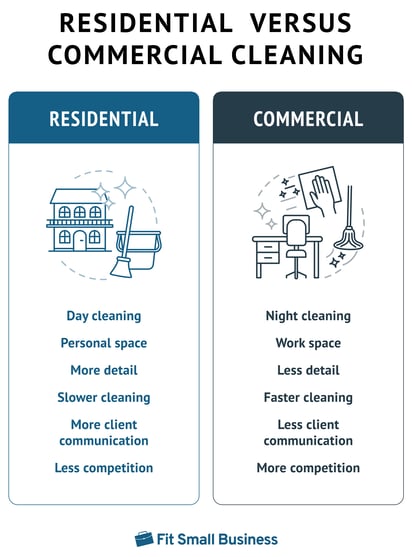 Source: Fit Small Business
Source: Fit Small Business
Let’s take a look at the key differences between the two:
- Areas Covered. Residential cleaning is relatively easier than commercial cleaning because it covers smaller, more personal areas. The size of residential homes goes anywhere from a hundred square feet to a few thousand, while commercial properties start in the mid-thousands.
- Manpower, Cleaning Supplies, and Equipment. Since commercial cleaning covers a larger area, commercial cleaning companies invest in more equipment and staff. Commercial cleaning jobs require experienced cleaners to use more powerful tools and equipment like industrial vacuum cleaners, pressure washers, steam cleaning technology, etc. The supplies and tools required in residential cleaning are much simpler and easier to use.
- Cleaning Methods. Both residential and commercial cleaning must meet standards of quality and efficiency. In general, however, commercial properties abide by stricter health and safety regulations compared to residential properties. Residential cleaning often follows a simple, straightforward, and tailor-made cleaning process. Commercial cleaning, on the other hand, is more complicated and requires more in-depth planning.
- Payment. Regular commercial cleaning jobs are usually paid monthly, while residential cleaning jobs are paid for on the day the cleaning service takes place.
- Cleaning Schedule. Residential cleaning jobs happen during the day, while commercial cleaning often takes place at night, after business hours.
Methods for Calculating House Cleaning Cost
You can choose from four main pricing methods or strategies to help you determine how much you should charge for your house cleaning services.
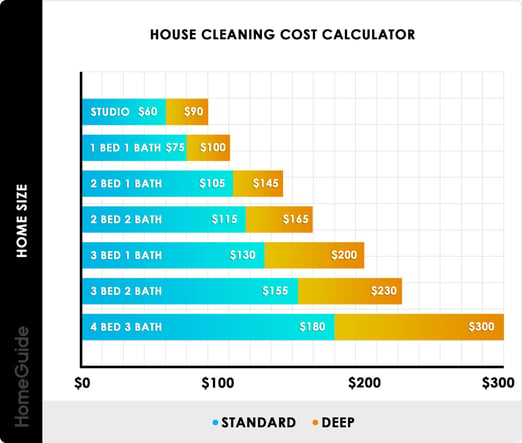
Source: HomeGuide
The Square Footage Method
This is a straightforward approach that calculates the cleaning rate based on the square footage that needs to be cleaned.
Simply put: you’ll calculate your cleaning price by how large the space is and how much time and manpower you need to complete the job.
It’s a good pricing model to use for large homes and similar-sized houses that require recurring cleaning. Visit the property and check its condition so you can give your customer the most accurate estimate.
On average, the price for a standard house cleaning service (recurring) is between $0.08 and $0.10 per square foot.
To calculate the price, you need to multiply the home size by how much you’ll charge per square foot.
For example, basic cleaning for a 2,500-square-foot home will cost between $200 to $250.
Meanwhile, the prices for one-time deep cleaning can range from $0.10 to $0.30 per square foot. That means a customer can expect to pay between $250 - $750 for a deep cleaning of a 2,500-square-foot house.
Per-Room Rates
This is a popular option that calculates the cleaning rate based on the type of room, the number of rooms you’ll have to clean, and the time it takes for you to clean each room.
Most house cleaning companies charge per bedroom and bathroom. Make sure that you price different types of rooms accurately. For example, it might take you longer to clean the kitchen than a bedroom or living room, so you’ll charge a higher rate for cleaning the kitchen.
To get your per-room rate, simply determine how much you’ll charge per room and then get the average of the prices between rooms.
For example, say you’ll charge $100 for a basic kitchen cleaning and $50 for a standard bathroom cleaning. In this case, the average cost per room is $75.
The average rate to clean a bedroom is $30 to $80, while the cost of cleaning a kitchen is between $65 and $150. A basic clean of a bathroom costs anywhere between $55 to $75, while a deep clean may range from $75 to $150, depending on the number of fixtures that need to be disinfected and sanitized.
At the higher end of the price range are basements and attics, which can cost between $100 to $500 to clean.
Per-Hour Rates
This type of pricing method is ideal for those who are just starting a house cleaning business — when you’re still figuring out how long the cleaning job will take.
Here are some factors to consider in setting an hourly cleaning rate:
- The number of cleaners needed to cover the home size
- The skills required to complete the job
- The frequency of cleaning (daily, weekly, one-off cleaning)
- How much the competition is charging
The national average for house cleaning rates per hour ranges from $25 to $50. A cleaning business with more experienced cleaners usually charges around $75 to $150 per hour, depending on the scope of the job.
Flat Rate
This is a common, simplified pricing method that estimates the cost of a house cleaning service based on value, not the time it takes to clean the property.
It’s a straightforward approach that makes it easier for customers to know how much they’ll be paying for every cleaning service.
This strategy is best for experienced cleaning businesses that already have a clear idea of how long it takes to clean houses of different types, sizes, and conditions.
The average flat rate for a basic house cleaning is between $100 to $200. Some cleaning businesses charge between $75 to $250 per visit.
Understanding Break-even and Profit Margins
The break-even point for your cleaning business is the stage at which your revenue equals your costs — which means there’s no profit or loss.
It's important to determine your cleaning business’s break-even point because it helps you…
- Gauge whether your business is profitable or sustainable
- Know your fixed and variable costs
- Know exactly how much you need to make to thrive in the industry
- Know when to raise prices, lower costs, or both
- Set long-term goals for your business
How Do You Calculate Your Break-even Point?
Before we get into the nitty-gritty, we do have a separate blog with a break-even calculator that you can interact with. Check it out here...
To calculate your break-even point yourself, you need to first determine the contribution margin. This is the difference between the price of your cleaning service and the cost to perform the service. (In the formulas below, you can define “unit” as your average cleaning job.)
You also need to find out your fixed costs and variable costs. Fixed costs refer to the expenses that remain the same no matter the changes in your business’s cleaning activities. Examples of fixed costs include rent, property taxes, salaries, and insurance.
Variable costs, on the other hand, are the expenses that change based on the number and type of cleaning jobs you take. For example, the manpower and supplies needed for different types of cleaning jobs aren’t always the same.
Contribution margin = (sale price per unit – variable cost per unit) ÷ sale price per unit
For example, your cleaning service per visit is priced at $200 with a variable cost of $25 per visit. Here’s how to calculate your contribution margin:
($200 - $25) ÷ 200 = 0.875
Your contribution market - 87.5% in this case - is the percentage of the selling price you keep after taking out variable expenses.
To calculate your cleaning business’s break-even point in sales dollars, you need to divide your fixed costs by your contribution margin.
Break-even point in sales dollars = fixed costs ÷ contribution margin
Let’s use the example above and set the monthly fixed costs at $10,000. Here’s how to calculate the break-even point in sales:
$10,000 ÷ 0.875 = $11,429
This means that you need to make at least $11,429 a month to keep up with expenses. Anything you make above that amount is your profit.
If you find this number intimidating, remember that we only used round, fictional numbers to illustrate how to find your break-even point. Your average selling price per job might be higher/lower, as well as your variable and fixed costs.
How Do You Calculate Your Break-even Point?
Profit margin is a good measure of your cleaning business’s profitability. It’s the percentage of the revenue that’s left after deducting all expenses.
Estimating your prices as accurately as you can helps you ensure a good profit margin for your cleaning business. But what does it take to be profitable? For a cleaning company, anywhere between 10% to 28% is a good profit margin. You can raise that percentage as your business grows.
Cleaning Rates Based on House Type

Source: Bankrate
Every house is unique, which means each home will have different cleaning requirements. Generally, you’ll determine your cleaning rate based on the house’s size, layout, and amount of cleaning required.
Small House
Cleaning a tiny house depends on where the house is located and the type of cleaning. Basic cleaning for a one-bedroom, one-bathroom house costs anywhere from $50 to $60. Prices for deep cleaning services can go as high as $260 for a small home.
Condo
Cleaning rates for a condo or apartment cleaning typically range between $60 and $200, but they could cost as low as $50 and up to $270 or higher. Estimates for a one-time clean of a three-bedroom, two-bathroom condo can go anywhere from $110 to $200.
Cottage
A cottage is a type of small home and its size is no more than 1,000 to 1,200 square feet. Typically, the standard cleaning prices of homes that are 1,000 square feet or less range between $50 to $110. One-time deep cleans and move-in cleaning requirements for this type of house can go as high as $350 to $520.
Duplex
On average, duplex homes have two to four bedrooms. The total number of rooms — which include a living room, dining area, and kitchen — ranges between 7 and 14. On average, the cost to clean a two-bedroom, two-bathroom home ranges from $175 to $225. Prices can go as low as $60 for a standard cleaning service, and as high as $20 for deep cleaning.
Townhouse
Townhouses tend to be larger than apartments and often have two or more bedrooms. The typical size of a townhouse is 1,000 to 1,400 square feet. The average basic cleaning cost for a two-bedroom townhouse ranges from $60 to $170. Deep cleaning prices can go as high as $600 while moving cleaning rates can reach $800.
Villa
Villas are spacious, single-story units that may be attached, detached, or semi-detached. The size of a villa can be anywhere from 1,200 square feet to 4,000 square feet. On average, it costs around $100 to $300 to have a 1,500-square-foot home deep cleaned.
Bungalow
Bungalows have smaller square footage than multi-story homes — between 1,000 and 2,000 square feet. Typically, bungalows have two bedrooms, but modern types may have three or more. The cost of cleaning multi-bedroom bungalows may range from $100 to $660, depending on the location, size, and type of cleaning.
Evaluate How You're Pricing Your Services
Knowing how to price home cleaning services is a surefire way to increase profits and grow a successful cleaning business.
Take your time in learning the ins and outs of the industry and use this guide to set a pricing strategy that works for your business and your customers.
%20(1)%20(1).png?width=340&name=Group%2012%20(2)%20(1)%20(1).png)



